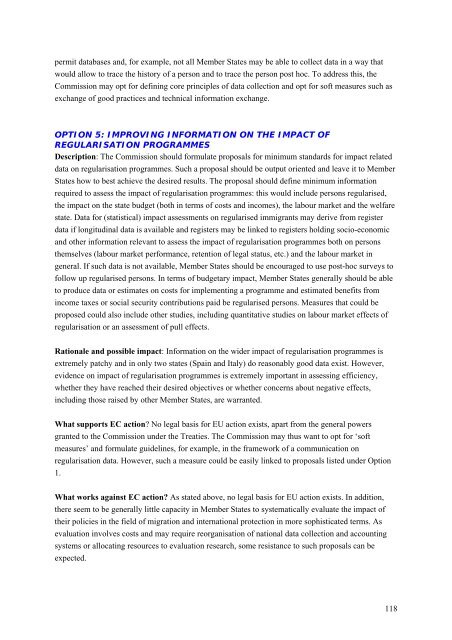REGINE Regularisations in Europe Final Report - European ...
REGINE Regularisations in Europe Final Report - European ...
REGINE Regularisations in Europe Final Report - European ...
Create successful ePaper yourself
Turn your PDF publications into a flip-book with our unique Google optimized e-Paper software.
permit databases and, for example, not all Member States may be able to collect data <strong>in</strong> a way that<br />
would allow to trace the history of a person and to trace the person post hoc. To address this, the<br />
Commission may opt for def<strong>in</strong><strong>in</strong>g core pr<strong>in</strong>ciples of data collection and opt for soft measures such as<br />
exchange of good practices and technical <strong>in</strong>formation exchange.<br />
OPTION 5: IMPROVING INFORMATION ON THE IMPACT OF<br />
REGULARISATION PROGRAMMES<br />
Description: The Commission should formulate proposals for m<strong>in</strong>imum standards for impact related<br />
data on regularisation programmes. Such a proposal should be output oriented and leave it to Member<br />
States how to best achieve the desired results. The proposal should def<strong>in</strong>e m<strong>in</strong>imum <strong>in</strong>formation<br />
required to assess the impact of regularisation programmes: this would <strong>in</strong>clude persons regularised,<br />
the impact on the state budget (both <strong>in</strong> terms of costs and <strong>in</strong>comes), the labour market and the welfare<br />
state. Data for (statistical) impact assessments on regularised immigrants may derive from register<br />
data if longitud<strong>in</strong>al data is available and registers may be l<strong>in</strong>ked to registers hold<strong>in</strong>g socio-economic<br />
and other <strong>in</strong>formation relevant to assess the impact of regularisation programmes both on persons<br />
themselves (labour market performance, retention of legal status, etc.) and the labour market <strong>in</strong><br />
general. If such data is not available, Member States should be encouraged to use post-hoc surveys to<br />
follow up regularised persons. In terms of budgetary impact, Member States generally should be able<br />
to produce data or estimates on costs for implement<strong>in</strong>g a programme and estimated benefits from<br />
<strong>in</strong>come taxes or social security contributions paid be regularised persons. Measures that could be<br />
proposed could also <strong>in</strong>clude other studies, <strong>in</strong>clud<strong>in</strong>g quantitative studies on labour market effects of<br />
regularisation or an assessment of pull effects.<br />
Rationale and possible impact: Information on the wider impact of regularisation programmes is<br />
extremely patchy and <strong>in</strong> only two states (Spa<strong>in</strong> and Italy) do reasonably good data exist. However,<br />
evidence on impact of regularisation programmes is extremely important <strong>in</strong> assess<strong>in</strong>g efficiency,<br />
whether they have reached their desired objectives or whether concerns about negative effects,<br />
<strong>in</strong>clud<strong>in</strong>g those raised by other Member States, are warranted.<br />
What supports EC action? No legal basis for EU action exists, apart from the general powers<br />
granted to the Commission under the Treaties. The Commission may thus want to opt for ‘soft<br />
measures’ and formulate guidel<strong>in</strong>es, for example, <strong>in</strong> the framework of a communication on<br />
regularisation data. However, such a measure could be easily l<strong>in</strong>ked to proposals listed under Option<br />
1.<br />
What works aga<strong>in</strong>st EC action? As stated above, no legal basis for EU action exists. In addition,<br />
there seem to be generally little capacity <strong>in</strong> Member States to systematically evaluate the impact of<br />
their policies <strong>in</strong> the field of migration and <strong>in</strong>ternational protection <strong>in</strong> more sophisticated terms. As<br />
evaluation <strong>in</strong>volves costs and may require reorganisation of national data collection and account<strong>in</strong>g<br />
systems or allocat<strong>in</strong>g resources to evaluation research, some resistance to such proposals can be<br />
expected.<br />
118
















